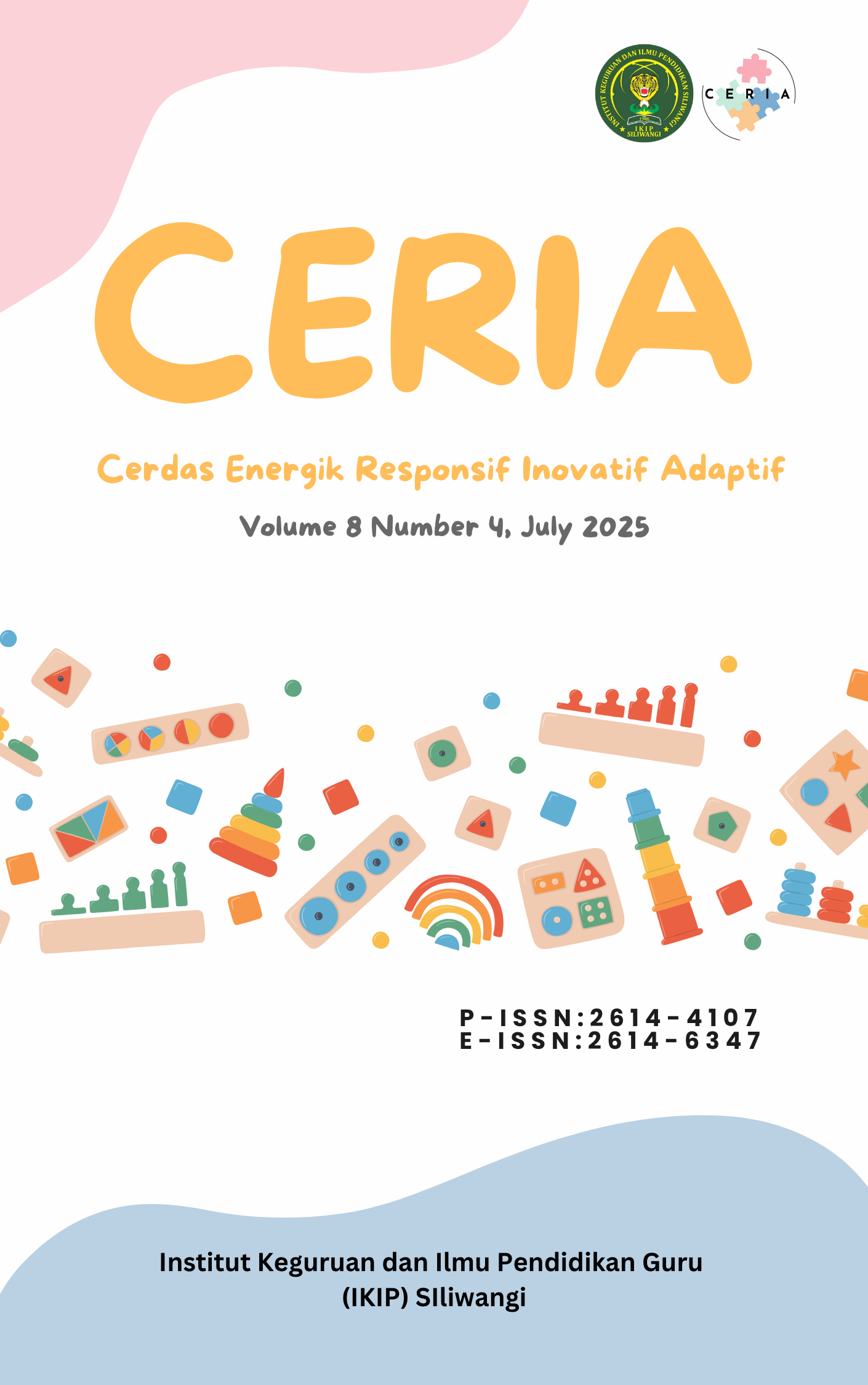Does Parental Involvement Affect The Development Of Social Skills In Early Childhood Education Students?
DOI:
https://doi.org/10.22460/ceria.v8i4.28755Keywords:
Parental Involvement, Social Skills, Early Childhood EducationAbstract
This study aims to examine the effect of parental involvement on social skills in early childhood education students in Bandung City (1). The research approach uses quantitative with a comparative study method that compares two groups of children based on their parental involvement (3). The sampling technique used is convenience sampling. This technique selects respondents who are easy to reach and willing to participate. This study involved 227 parents who assessed their involvement in their children's education through a self-report scale, and 34 early childhood education teachers who assessed their children's social skills through observation (2). The instruments used consisted of a parental involvement scale and an observation-based social skills scale. Data analysis used the Mann-Whitney U nonparametric statistical test to see differences in children's social skills based on the level of parental involvement. The results showed that there were significant differences in the social skills of early childhood education students between children with high and low parental involvement (5). Children with higher parental involvement tend to have better social skills. This topic is important to study considering the role of parents in early childhood education is a key factor in forming social skills that are important for children's development in the future
References
Ainsworth, M. D. (1989). Attachments beyond infancy. American Psychologist, 44(4), 709–716. https://doi.org/10.1037/0003-066X.44.4.709
Bornstein, M. H., Hahn, C.-S., & Haynes, O. M. (2012). Social competence, externalizing, and internalizing behavioral adjustment from early childhood through early adolescence: Developmental cascades. Development and Psychopathology, 24(3), 837–851. https://doi.org/10.1017/S0954579412000385
Bowlby, J. (1969). Attachment and loss: Vol. 1. Attachment. Basic Books.
Bronfenbrenner, U. (1979). The ecology of human development: Experiments by nature and design. Harvard University Press..
Denham, S. A., Bassett, H. H., & Zinsser, K. (2012). Early childhood teachers as socializers of young children’s emotional competence. Early Childhood Education Journal, 40, 137–143. https://doi.org/10.1007/s10643-012-0504-2
Eisenberg, N., Spinrad, T. L., & Knafo, A. (2015). Prosocial development. In R. M. Lerner (Ed.), Handbook of child psychology and developmental science (Vol. 3, pp. 1–47).
Fan, X., & Chen, M. (2001). Parental involvement and students’ academic achievement: A meta-analysis. Educational Psychology Review, 13(1), 1–22. https://doi.org/10.1023/A:1009048817385.
Fantuzzo, J., McWayne, C., Perry, M. A., & Childs, S. (2004). Multiple dimensions of family involvement and their relations to behavioral and learning competencies for urban, low-income children. School Psychology Review, 33(4), 467–480. https://doi.org/10.1080/02796015.2004.12086266
Grolnick, W. S., & Slowiaczek, M. L. (1994). Parents' involvement in children's schooling: A multidimensional conceptualization and motivational model. Child Development, 65(1), 237-252.
Hill, N. E., & Tyson, D. F. (2009). Parental involvement in middle school: A meta-analytic assessment of the strategies that promote achievement. Developmental Psychology, 45(3), 740-763
Hornby, G., & Lafaele, R. (2011). Barriers to parental involvement in education: An explanatory model. Educational Review, 63(1), 37–52. https://doi.org/10.1080/00131911.2010.488049
Jeynes, W. H. (2005). Parental involvement and student achievement: A meta-analysis. Harvard Family Research Project. https://doi.org/10.3200/TCHS.78.3.172-180
Lau, E. Y. H., & Power, T. G. (2018). Parental involvement and child school adjustment: Mediating roles of parenting style and child temperament. Educational Psychology, 38(4), 596–611. https://doi.org/10.1080/01443410.2017.1384535
Padilla-Walker, L. M., & Christensen, K. J. (2011). Empathy and self-regulation as mediators between parenting and adolescents’ prosocial behavior toward strangers, friends, and family. Journal of Research on Adolescence, 21(3), 545–551. https://doi.org/10.1111/j.1532-7795.2010.00695.x
Tudge, J. R. H., Mokrova, I., Hatfield, B. E., & Karnik, R. B. (2009). Uses and misuses of Bronfenbrenner’s bioecological theory of human development. Journal of Family Theory & Review, 1(4), 198–210. https://doi.org/10.1111/j.1756-2589.2009.00026.x
Walker, H. M. (2005). Interventions for academic and behavior problems II: Preventive and remedial approaches. National Association of School Psychologists.


